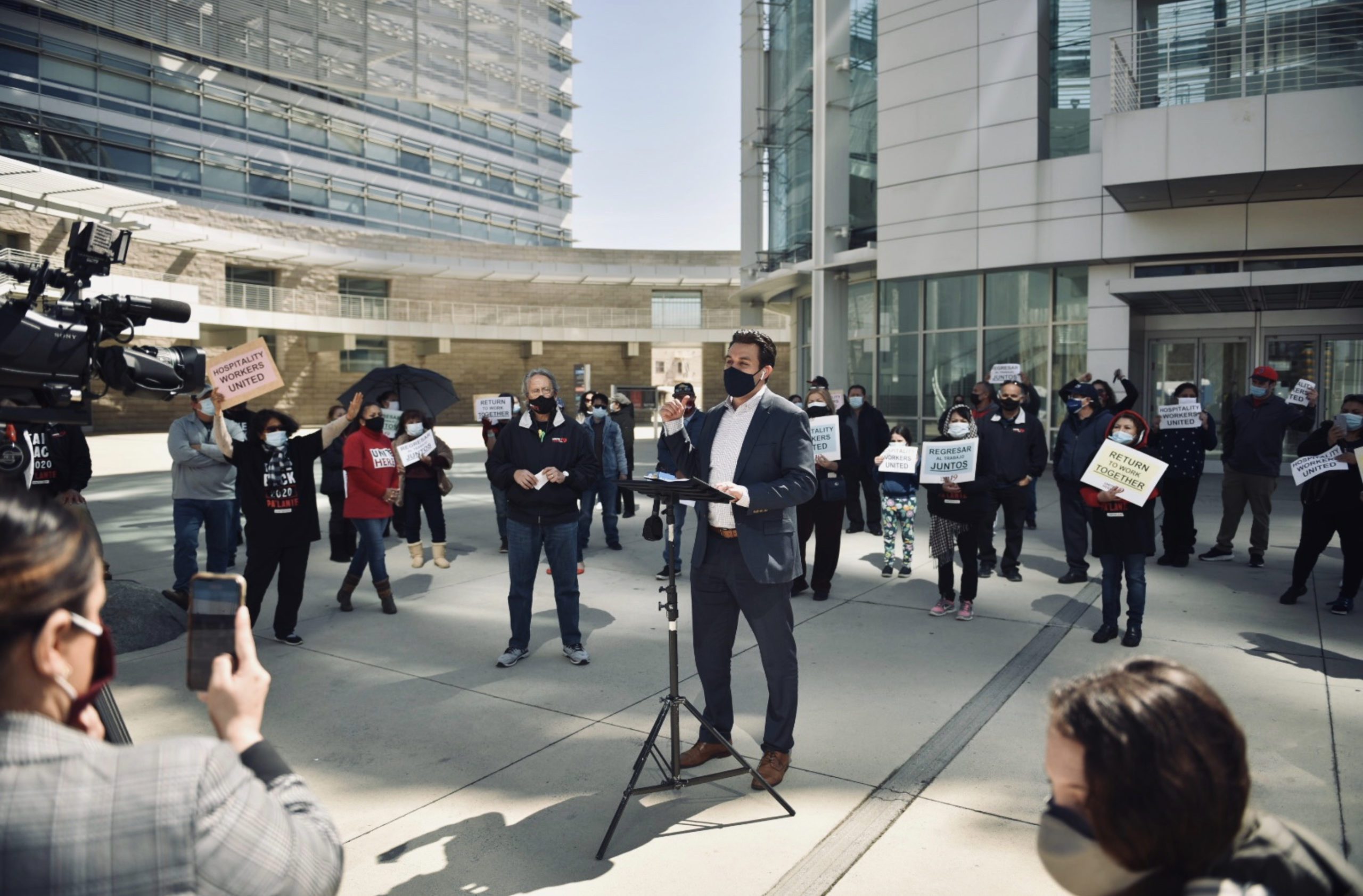Losing her job at the DoubleTree hotel in San Jose during the pandemic meant Maria De Rueda could no longer afford to send her son to college. She got laid off after 21 years of service.
“We had to tell our son that we could no longer afford his university tuition,” she said. “I want to get my job back when this is all over so that I can start paying for his education again and start planning for the future education of my two younger daughters. I dream of my children being the first in our family to earn a degree.”
The hospitality industry has been one of the hardest hit areas of the local and national workforce. DoubleTree has pledged to bring back its workers when possible, but not all local hospitality businesses have agreed to do the same, prompting local lawmakers to take action.
Elected leaders voted unanimously at a committee meeting Wednesday to bring a new law to the San Jose City Council that would ensure seasoned hospitality workers get their jobs back.
“Please support this ordinance,” De Rueda continued. “So all hospitality workers can have hope again.”
Councilmembers Raul Peralez, David Cohen and Sergio Jimenez, who proposed the new law, noted that San Jose’s hospitality workers are primarily people of color who have already been disproportionately hurt by COVID-19.
Vice Mayor Chappie Jones and Councilmembers Sylvia Arenas and Dev Davis also supported the plan.
The so-called “Return Together” ordinance would mandate employers in the hospitality industry to rehire hotel workers, janitors and airport workers, among others, when they reopen after the shelter in place order lifts. Priority will be given based on how long those individuals have worked for the employer.
“This is a no-brainer policy,” Peralez said. “We want those workers that have served us and served our community for decades.”

According to a 2021 report by the American Hotel and Lodging Association, nearly 4 million U.S. hospitality jobs were lost in 2020 as a result of the pandemic.
The push to rehire Silicon Valley hospitality workers comes as the Fairmont Hotel — located in San Jose’s urban core — buckled under pandemic pressures. The hotel went bankrupt and closed temporarily March 5. Management relocated guests and cut employees loose.
The hotel is expected to rebrand and rise again under new management within the next few months.
Joslin Morrison, who worked at the Fairmont Hotel for four decades, got laid off when the hotel closed.
“It’s a very sad time. We put in so much work making the Fairmont Hotel a pillar of San Jose’s hospitality industry,” Morrison said. “Me and my daughter have no income. This is a very stressful time for me and my co-workers as well. The Return Together ordinance is an opportunity for you to make sure employers do the right thing.”
Sarah McDermott with the Unite Here Local 19 — a union that represents hotel workers across the South Bay — said many members are waiting in line for hours to get food.
“The recent closure of the Fairmont San Jose highlights the need for this ordinance,” McDermott said. “This is the minimum labor standard, like the minimum wage, so you as a council have the authority to pass this ordinance.”

Opposition
Business leaders from the San Jose Downtown Association and Silicon Valley Organization (SVO) said San Jose needs to slow down and first talk to businesses that would be bound by the new law.
“I’m here today to voice my organization’s concerns that there has not been sufficient time to conduct stakeholder outreach,” said Eddie Truong, SVO’s director of government and community relations. “The proposed policy will require private employers to re-hire laid off employees by order of seniority without much consideration about the new legal complexities that it would create.”
Peralez countered the city would have three weeks to discuss with stakeholders and work out any problems or legal kinks.
Arenas said businesses would benefit from not having to hire and retrain a new set of employees.
“When you train a new set of folks, that’s a loss,” Arenas said. “That’s a loss of the training you garnered before and that you invested in before the loss of jobs and before this pandemic.”
San Jose Assemblymember Ash Kalra last year introduced Assembly Bill 3216, which would have helped hospitality workers statewide retain their jobs and get recalled to work. Although the bill passed both houses of the Legislature, it was vetoed by Gov. Gavin Newsom.
“AB 3216 would have been instrumental in establishing statewide policies to protect our working families and our essential workers who were not at fault when they lost their jobs,” Kalra wrote in a letter to the council. “I hope San Jose can take the initiative to stand up for our most vulnerable workers.”
Other cities, including San Diego, Oakland and San Francisco, passed similar laws last year. The San Jose City Council will discuss the proposal on April 13.
Contact Carly Wipf at [email protected] or follow @CarlyChristineW on Twitter.



Leave a Reply
You must be logged in to post a comment.